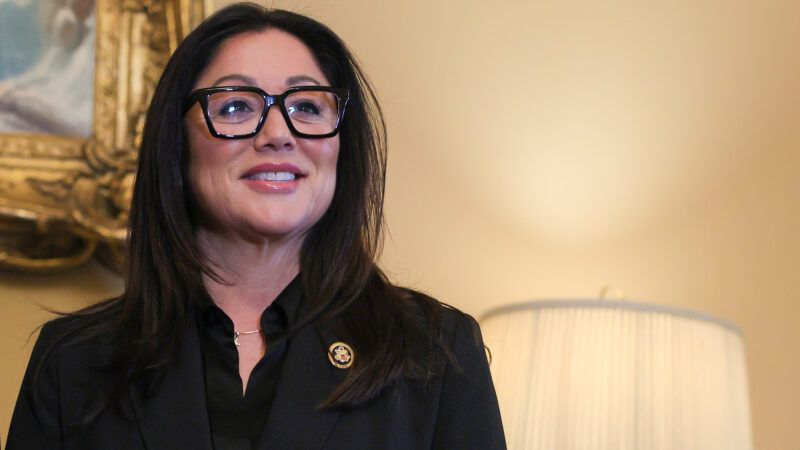Trump's Labor Secretary Pick Is a Union Favorite—and a Threat to Right-to-Work Laws
Lori Chavez-DeRemer’s record shows a troubling pattern of undermining workplace freedom and expanding federal control over state labor policies.

Given the salacious allegations against some of President Donald Trump's cabinet nominations, it is understandable how secretary of labor nominee Lori Chavez-DeRemer has mostly flown under the radar. But from a policy perspective, Chavez-DeRemer's voting record is concerning—especially for those who value federalism and coercion-free workplaces.
For most of her political career, Chavez-DeRemer, who lost her Oregon congressional seat in November, has been a polarizing figure. The daughter of a Teamster, her soft spot for unions puts her at odds with her Republican colleagues and right-of-center groups. In a letter to the Senate, president of the National Right to Work Committee Mark Mix wrote that Chavez-DeRemer's judgment is "clearly compromised" and that she "must be rejected as the Secretary of Labor."
The other side of the aisle offers mixed reviews. Sen. Elizabeth Warren (D–Mass.) called Chavez-DeRemer "a strong candidate for the job." Yet other Democrats—many of whom contributed to the $20 million campaign against Chavez-DeRemer's reelection bid—think she is "hardly" pro-union.
Even unions seem divided on the potential labor secretary. American Federation of Teachers President Randi Weingarten and International Brotherhood of Teamsters President Sean O'Brien endorsed Chavez-DeRemer's cabinet nomination. But the AFL-CIO gave her record a low-end 10 percent rating—only four points above the average House Republican.
This week, senators asked to confirm Chavez-DeRemer will have to sort all of this out.
Chavez-DeRemer has backed legislation that would disproportionately benefit labor unions at the expense of the workers they purportedly represent. For example, she was one of only three Republicans to cosponsor the Protecting the Right to Organize Act of 2021 (PRO Act). If passed, the PRO Act would effectively repeal right-to-work laws prohibiting mandatory union membership as an employment condition. Currently, 26 states have right-to-work statutes. This legislation would unduly subvert federalism.
The PRO Act would also be devastating economically. States with right-to-work laws report higher rates of employment (especially in manufacturing), business investment, and employee life satisfaction. Research also suggests that per-hour wages—especially for low-income employees—have increased in right-to-work states.
Moreover, the PRO Act would undermine workplace democracy. The bill allows unions to "card check," a questionable union tactic that ostensibly abolishes secret ballot votes for union authorization. If a union can collect a simple majority of "signed cards" from employees, it can become the exclusive representative for workers. Without the anonymity guaranteed by a secret ballot, workers are susceptible to coercion and pressure campaigns to vote favorably for the unions.
When faced with these realities, Chavez-DeRemer eventually abandoned the PRO Act and recently conceded that the legislation was "unworkable." But instead of learning her lesson, she doubled down by cosponsoring the Public Service Freedom to Negotiate Act of 2024 (PSFNA). If you thought the PRO Act was bad, then Chavez-DeRemer's support of the PSFNA is disqualifying.
If adopted, the PSFNA would set "minimum standards" for how states negotiate with government unions. However, these standards are anything but minimal, mandating unionization rights for nearly all government employees, requiring unelected arbitrators or outside decision-makers, and allowing automatic payroll deduction of union dues. Many states would have to create a new state agency to meet these requirements.
The PSFNA also radically expands the scope of the federal oversight of labor laws. The proposed law would task the Federal Labor Relations Authority (FLRA) to evaluate each state's labor policies. If the FLRA finds that a state does not meet the minimum standards, the agency can assume regulatory and enforcement control at both the state and local levels. Such authority would also empower the FLRA to oversee every government union election and resolve any labor violations or challenges in arbitration.
To put these standards into perspective, right now, not one state fully meets the PSFNA's minimum standards. In fact, many of its requirements exceed those of union-friendly states like California, New York, and Illinois. Meanwhile, right-to-work states with minimal resources would need to scramble to comply with the litany of PSFNA's unfunded mandates or risk federal intervention in state government workplaces.
Assuredly, working-class voters delivered Trump to the White House. But Chavez-DeRemer's record suggests she is out of step with the president's expressed economic agenda. Moreover, bills like the PSFNA and PRO Act would harm taxpayers and employees alike.
Her hearings may not involve discussion of lewd behavior or conspiracy theories, but Chavez-DeRemer's support of undemocratic legislation should be enough for senators to reject her nomination.


Show Comments (32)